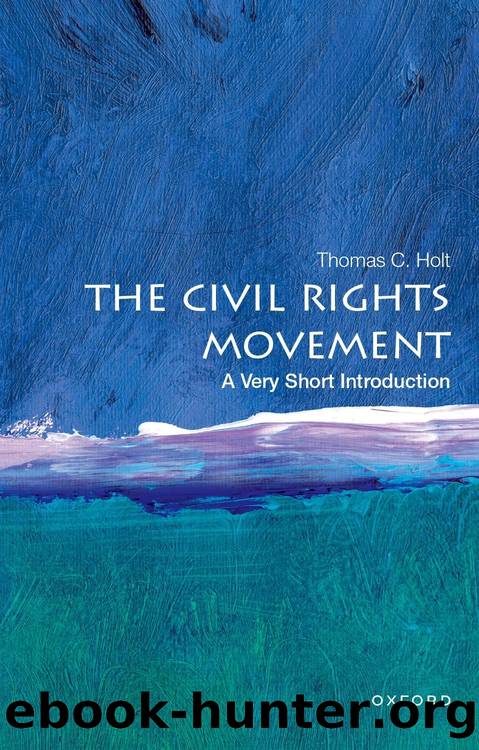The Civil Rights Movement by Thomas C. Holt

Author:Thomas C. Holt [Holt, Thomas C.]
Language: eng
Format: epub
ISBN: 9780190605445
Publisher: Oxford University Press
Published: 2022-11-28T00:00:00+00:00
Chapter 4
Organizing in the âAmerican Congoâ: Mississippiâs Freedom Summer and its aftermath
There is a striking irony about the chronology and character of the so-called classic Civil Rights Movement: Many of its participants attribute their own commitments to it, if not its very origins, to the brutal murder of Emmett Till, and yet the major mobilizations during its first decade emerged far beyond the site of Tillâs martyrdom. The casual brutality of a teenage boyâs murder and mutilation of his body compounded by the bland indifference of white Mississippians to punishing the crime, made clear that this state was not a favorable place to mobilize a mass movement. In retrospect, it is equally clear that the grievances that sparked equal rights mobilizations elsewhere in the South were largely irrelevant to the lives and injustices suffered by most black Mississippians, then or later. Even for blacks from other southern states, Mississippi seemed a place out of time, a good place âto be fromâ went a wry and bitter joke. Or, as William Pickens, an NAACP staffer investigating a gruesome lynching in 1921, called it, âthe American Congo.â Written at a moment when King Leopoldâs reign of unconscionable terror in the Belgian Congo was being widely condemnedâeven by other colonial powersâas marking the outer boundaries of human depravity, Pickensâs depiction was damning indeed.
Pickensâs characterization referred to the Delta, the corridor framed by the counties stretching along both sides of the Mississippi River from southeastern Missouri down to Vicksburg, which was one of the most fertile cotton regions in the South. This region was less a remnant of its antebellum slave empire than an early twentieth-century creation of northern and English capitalists that would come to be known later for its extreme poverty and racial terror. In the 1890s, it had been a refuge for black migrants seeking independent farms free from the oppressive conditions of the old cotton economy of the southeastern states. In the Delta they could cut timber for good wages and buy land. At the dawn of the twentieth century, descendants of these pioneers still accounted for two out of every three farm owners in the region, but a quarter-century later most of them had been reduced to landless laborers on vast industrial plantationsâliterally totalitarian communities that supplied them bare subsistence, monitored their mail, and restrained their every movement.
As elsewhere in the South, however, white hegemony in the Delta began to erode under the pressure of social and economic changes set in motion during the First World War and the Great Migration. The interwar period witnessed flickers of resistance as farmersâ unions and chapters of both the NAACP and Marcus Garveyâs United Negro Improvement Association became active. In the aftermath of the Second World War, those flickers flamed even brighter and bolder as returning veterans mounted more militant and visible challenges to the racial order. Notable among the activists undertaking these initiatives were veterans of the recent world war, men like Amzie Moore, Aaron Henry, and Medgar Evers. A postal
Download
This site does not store any files on its server. We only index and link to content provided by other sites. Please contact the content providers to delete copyright contents if any and email us, we'll remove relevant links or contents immediately.
Phoenicians among Others: Why Migrants Mattered in the Ancient Mediterranean by Denise Demetriou(600)
american english file 1 student book 3rd edition by Unknown(597)
Verus Israel: Study of the Relations Between Christians and Jews in the Roman Empire, AD 135-425 by Marcel Simon(589)
Caesar Rules: The Emperor in the Changing Roman World (c. 50 BC â AD 565) by Olivier Hekster(569)
Basic japanese A grammar and workbook by Unknown(564)
Europe, Strategy and Armed Forces by Sven Biscop Jo Coelmont(513)
Give Me Liberty, Seventh Edition by Foner Eric & DuVal Kathleen & McGirr Lisa(491)
Banned in the U.S.A. : A Reference Guide to Book Censorship in Schools and Public Libraries by Herbert N. Foerstel(483)
The Roman World 44 BC-AD 180 by Martin Goodman(472)
Reading Colonial Japan by Mason Michele;Lee Helen;(465)
DS001-THE MAN OF BRONZE by J.R.A(458)
Imperial Rome AD 193 - 284 by Ando Clifford(451)
The Dangerous Life and Ideas of Diogenes the Cynic by Jean-Manuel Roubineau(451)
Introducing Christian Ethics by Samuel Wells and Ben Quash with Rebekah Eklund(447)
The Oxford History of World War II by Richard Overy(444)
Catiline by Henrik Ibsen--Delphi Classics (Illustrated) by Henrik Ibsen(422)
Literary Mathematics by Michael Gavin;(407)
Language Hacking Mandarin by Benny Lewis & Dr. Licheng Gu(403)
Brand by Henrik Ibsen--Delphi Classics (Illustrated) by Henrik Ibsen(382)
